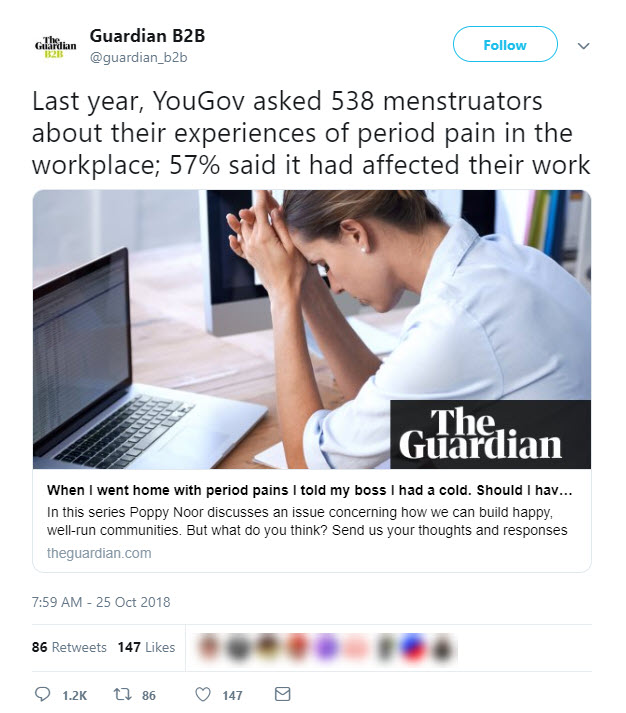We all know how powerful language can be, with phrases like #metoo helping to unify entire social movements, but we sometimes forget how much impact we can have with the language we randomly choose to use as part of our day.
I’ve seen two examples recently where a word, or a turn of phrase, has resonated in completely the wrong way and resulted in backlash and debate.
The perils of politicised language
While it’s important for brands to stand by their values, even if it means engaging in political / social issues, it’s worth remembering that that engagement comes at a risk.
The Guardian probably understood this when it tweeted out a YouGov study about women who have periods and changed the word “women” (which was used in the original study) to “menstruators”. (Okay, so, they may have also done this for the clicks…)
This prompted a debate in the replies under the tweet from people who were incredulous that women had been reduced to a single bodily function. Others responded that this was a completely fair use of language because using the word “women” would exclude trans men, and women who don’t have periods.
Some people have tweeted the journalist who wrote the article to deride her use of the word, while #GuardianSongs and #GuardianMovies trended on Twitter, where people replaced the word woman in song and movie titles with the offending word. While some of the responses were funny, some were derogatory towards the use of non-binary genders and pronouns.
To think, all of this could have been avoided if the writer had just written “Last year, YouGov asked 538 people about their experiences of period pain in the workplace,” Or just quoted the original YouGov survey – which only surveyed women. Instead, they wrote:
I can understand why people want to see more inclusive language used, but there has to be a better way than reducing women to a biological function.
Defensive or dismissive?
Another business having language problems is Red Dead Redemption 2 developer, Rockstar.
While millions of gamers have been excited for the release of the game, the hype surrounding the run-up to its release has been dulled somewhat by accusations around the working conditions of Rockstar’s employees.
It all kicked off when one of Rockstar’s co-founders spoke to Vulture about his work on the game, and said that “we were working 100-hour weeks” at various points in 2018.
The statement prompted other developers to come out against working such long hours, with some saying that it wasn’t something to be boastful about.
https://twitter.com/Peter5tewart/status/1051779183142154240
Rockstar responded to the outrage with a long statement in the co-founder’s name containing remarks such as: “we obviously don’t expect anyone else to work this way.” And “No one, senior or junior, is forced to work hard.” It was a passion project for the senior team you see, so they drove themselves exceptionally hard for a reason.
The statement annoyed and offended some people who worked on Red Dead Redemption 2 who claimed that they’ve sometimes had to work 100 hour weeks and that the usually short ‘crunch’ period (where developers work like the clappers to get the game finished on time) lasted for months.
Rockstar has allowed employees to speak to the media (although most are doing so anonymously as they fear for their jobs). Some employees have said that the culture of expected overtime extended all the way back to the development of Grand Theft Auto IV (which was released in April 2008) with others saying that overtime was an issue during GTA V as well. As one employee told Eurogamer:
“There was a point on GTA5 when we were brought in by department and told we’d be working an extra 16 hours a week now. That was as official as anything became. It was pretty much: ‘we’d really appreciate you working an extra 16 hours a week and if you don’t we won’t appreciate it’.”
Since the negative media coverage, Rockstar has apparently told their employees that all overtime is voluntary, but some don’t believe it.
It’s no real surprise if what these employees have been saying is true – it’s easy to say the right things and still pressure people to act the way you want them to. In this case, camaraderie is a big factor. If you go home at 5pm, you’re leaving all of your friends with even more work. How can you do that? Don’t you know we’re all in this together?
It’s easy for a business to say the right thing, but doing the right thing is a commitment. Managers, supervisors and team leaders have to reinforce this new message every day, especially if an expectation is so ingrained in a corporate culture.
It can also be easy for leaders to appear to be dismissive. C-suite level executives in charge of a global company of thousands can’t be in every office at every hour of the day. They don’t always know how hard people are working, or what sacrifices they’ve made to make a product or service succeed. If they make statements that go against people’s experiences, it can have a significant negative effect on their morale.
Search for these stories on social media, and you’ll find people saying they’ve stopped their donations to The Guardian. For Rockstar, the issue isn’t “will people buy it?” (the reviews say it’s amazing and people were queuing at midnight to get a copy), but how will the company fix its relationship with its employees? And will the publicity make people think twice about working there? Will there be a long-term impact?
Language is a powerful tool. Whether it’s an off-the-cuff remark made during an interview with a journalist or choosing to use one word over another in an article, the choice you make can change the entire tone of the content and shift opinions in ways it’s not always simple to counter.
–








